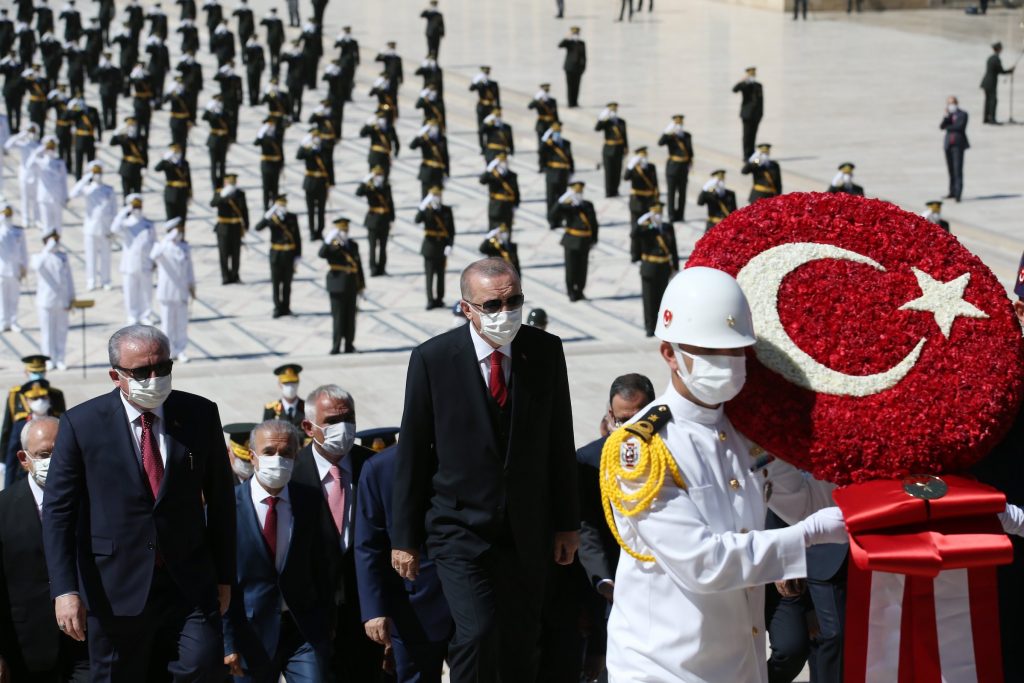Despite coronavirus pandemic restrictions, this year’s Zafer Bayramı, or Victory Day, went ahead as planned with events held throughout Turkey to commemorate the country’s final victory in its War of Independence nearly a century ago.
In line with tradition, President Recep Tayyip Erdoğan led political leaders and senior-ranking military officials to lay wreaths at Anıtkabir, the mausoleum of Mustafa Kemal Atatürk in Ankara. The President also delivered a blistering statement at the start of the day:
“Through victory on Aug. 30 [1922], it has been declared to the whole world once again that these lands are our eternal homeland,” President Erdoğan said.
“It is absolutely not a coincidence that those who seek to exclude our country from the Eastern Mediterranean are the same invaders as those who attempted to invade our country a century ago,” he added.
After the ceremony at Anıtkabir, President Erdoğan repeated his message that: “Turkey, in the Eastern Mediterranean in particular, will not bow to threats, intimidation and blackmailing language, and will continue to defend its rights arising from international law and bilateral agreements.”
Tensions have been rising in the Eastern Mediterranean in recent months due to rivalry between Turkey and Greece over territorial waters. The issue has been compounded by a parallel dispute between Turkish Cypriots and Greek Cypriots on rights to gas resources off the coast of Cyprus.
France and Italy have waded into the issue, joining Greece and South Cyprus in naval exercises in the Eastern Mediterranean last week.
France, Italy and Greece were among the foreign countries to invade and occupy parts of the Ottoman Empire over a hundred years ago, with France and Greece fighting on against the Turks in their War of Independence between 1919 and 1922.
Although there were no major public parades, the country’s armed forces commemorated the day with various tributes. Across Turkey, wreaths were laid at monuments of Atatürk, as the national anthem played.
Turkish naval students salute North Cyprus on Victory Day
Students from the Turkish naval academy spelt out Mavi Vatan (Blue Nation) as they saluted the Turkish Republic of North Cyprus on board the TCG Sancaktar in the Eastern Mediterranean. In Erzincan, five pilots parachuted, opening Turkish flags in the air as a tribute to fallen soldiers from the War of Independence.
There were celebrations in Istanbul too, organised by Mayor Ekrem İmamoğlu, including a large concert featuring Haluk Levent, which people attended in their cars to ensure social distancing. During the day, there was horse racing and family-friendly activities at sites such as the Kemerburgaz Kent Ormanı (Kemerburgaz Urban Forest).
Mayor of Istanbul Ekrem İmamoğlu led the Victory Day celebrations in the city
Milletin zaferi, milletin bayramı 30 Ağustos kutlu olsun. pic.twitter.com/TsaCyG36HX
— Ekrem İmamoğlu (@ekrem_imamoglu) August 30, 2020
The Battle of Dumlupınar, 26-30 August 1922
On 30 August 1922, the Turks beat forces from Greece at the Battle of Dumlupınar, near Kütahya. The four day fight marked the end of a series of battles between the two sides known as the Greco-Turkish War.
Greece had nearly 30,000 more troops for Dumlupınar, but its battle-weary men, low on morale, suffered heavy casualties against the rejuvenated Turks led by Mustafa Kemal.
The Turkish Commander-in-Chief had given his troops breathing space in the run-up to this battle, as smart diplomatic negotiations by the Turks essentially split the allies, as Italy and France backed away from Greece and the pro-Greek British.
Disorganisation, fatigue and desertion left the Greek forces in disarray and after losing at Dumlupınar, their forces retreated, marking the end of their presence in Anatolia.
The last Greek troops left Anatolia on 18 September. The following month, Turkey, Italy, France and Great Britain signed the Armistice of Mudanya on 11 October 1922. Three days later, Greece was also forced to accede to it.
The decisive Battle of Dumlupınar is regarded by Turks as their Victory Day and has been celebrated each year on 30 August. In 1926, the date was made a public holiday.





